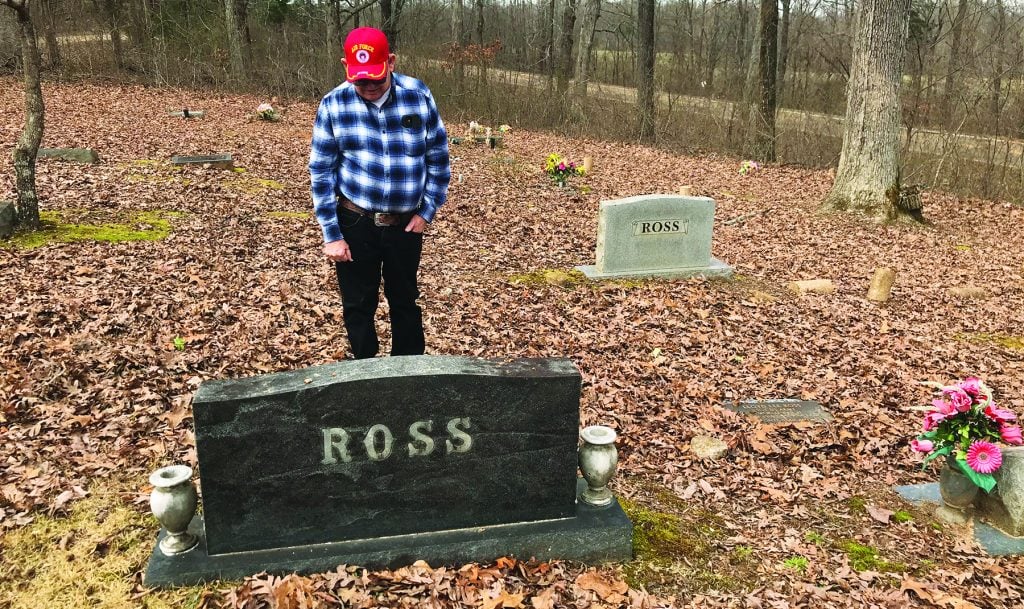
‘A hundred years goes faster than you think’
CEDAR GROVE, Tenn. — My dad, Bob Ross, bent down…
| Refresh | This website christianchronicle.org/a-grandsons-tribute-to-two-special-people/ is currently offline. Cloudflare's Always Online™ shows a snapshot of this web page from the Internet Archive's Wayback Machine. To check for the live version, click Refresh. |
As a boy, I did not recognize the true gifts from God that my grandparents were.
It took growing up for me to appreciate my grandparents as real people who endured real struggles and real disappointments but kept their focus on their faith and their family.
Papa and Grandma both grew up poor in single-parent households during the Great Depression. Papa’s father died when he was 8 months old, while Grandma was 12 when her dad died.
My grandfather, Lloyd Lee Ross, was 22 and my grandmother, Margaret Magdaline House, barely 16 when they married on Feb. 5, 1941. Papa hocked his shotgun for less than $5 to pay for the marriage certificate.
Their first son, my uncle Chuck, arrived less than a month after the Japanese bombed Pearl Harbor. Papa was drafted into the Army and, after basic training, headed to Sicily and North Africa. The day Papa was shot in the face, famous war correspondent Ernie Pyle happened to be in the operating room.
Here’s how Pyle described Papa in the book Brave Men: “One soldier had caught a machine-gun bullet right alongside his nose. It had made a small clean hole and gone through his cheek, leaving — as it came out —a larger hole just beneath his ear. It gave me the willies to look at it, yet the doctors said it wasn’t serious at all.”
My aunt Cathy was born in July 1943. But Papa did not see her until she was 14 months old. My dad, Bob, came along in May 1945 while Papa was stationed at Camp Polk, La., an internment camp for German prisoners. The next year, Papa and Grandma endured the heartache of stillborn twin girls. My uncle Kenneth was born in March 1948.
After the war, Papa returned to his hometown of Portageville, Mo., working as a cotton sharecropper. He later bought a Tennessee farm before returning to Missouri as a carpenter and commercial fisherman. Grandma helped support the family by sewing in a garment factory.
Their life, however, revolved not around work — but church.
My mom was 16 when she started dating my dad and met Papa and Grandma in 1963. Mom had grown up in a religious family, but not one like this.
“Your dad never missed church,” Mom told me, “and it was because of them. He went, no matter what, every single time. I wasn’t used to that. That’s one of the reasons thatI became a Christian.”
Papa and Grandma didn’t just talk about faith; they lived it. If anybody needed help, Papa and Grandma were first to reach in their wallets. They’re not perfect people, but as my dad explained, Papa “could borrow money at the bank without even having to sign his name. They knew he was honest.”
Some of my earliest memories of Papa and Grandma are on a light blue church bus. Every Sunday morning, Papa and Grandma would get up early and drive all over the countryside, picking up children, taking them to church and teaching them to sing “Jesus Loves Me.”
Years later, I learned that not everyone had appreciated Papa and Grandma’s bus ministry. You start filling a white church’s pews with black children, especially in the 1970s, and people talk.
Their 65th anniversary fell on a Sunday, and, of course, they attended morning worship before going home to a celebratory meal that included a cake and two pies.
Papa can’t see as well as he used to, so driving to Sunday night and Wednesday night services is mostly an event of the past, like driving that bus.
But their lives of faith and love remain an inspiration to their four children, 12 grandchildren, nearly 20 great-grandchildren and countless others blessed to know them.
Every summer, I watch as my own three children learn about baiting hooks and making quilts when we spend time with Papa, Grandma and other relatives in rented cabins on a Tennessee lake.
The memories we’re making now aren’t the same, but they’re just as precious as my childhood ones. My children may never buy a 10-cent bag of candy, but every year they experience something even sweeter.
Bobby Ross Jr. is Managing Editor of The Christian Chronicle. Reach him at [email protected].
Subscribe today to receive more inspiring articles like this one delivered straight to your inbox twice a month.
Your donation helps us not only keep our quality of journalism high, but helps us continue to reach more people in the Churches of Christ community.